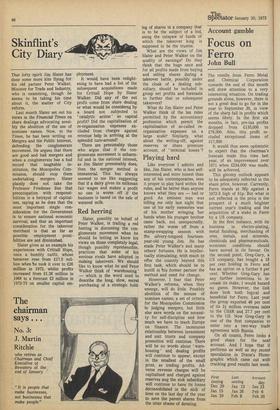Skinflint's City Diary
That lofty spirit Jim Slater has done some more kite flying for his old partner Peter Walker, Minister for Trade and Industry, who is examining, though he seems to be taking his time about it, the matter of City reform.
Last month Slater set out his views in the Financial Times on share dealings advocating sensibly the abolition of the use of nominee names. Now, in the Times, he has been writing on Mergers and the Public Interest, defending the conglomerate movement. He argues that there are good and bad mergers and when a conglomerate has a bad record that laughable institution, the Monopolies Commission, should stop them undertaking mergers. Slater plainly does not take the Professor Friedman line that preoccupation with responsibilities is a betrayal of capitalism, saying as he does that the most important single consideration for the Government is to ensure national economic survival, and that an important consideration for the takeover merchant is that as far as possible employment possibilities are not diminished.
Slater gives as an example his experiences with Crittall Hope, once a bumbly outfit, whose turnover rose from £17.5 million when 'he took it over to E26 million in 1972, whilst profits increased from £1.26 million in 1968 to a forecast E2 million in 1972-73 on smaller capital em ployment.
It would have been enlightening to have had a list of the subsequent acquisitions made for Crittall Hope by Slater Walker. Did any of the net profit come from share dealing or what would be considered by a board not subjected to 'catalytic action' as capital profit? Did the capitalisation of re-organisation expenses excluded from charges against revenue help in arriving at the splendid turn-around?
There are presumably those who argue that if the conglomerate movement is unharmful and in the national interest, as Jim Slater presumably does, then the merger method is immaterial. This has always seemed to me like suggesting that if a dairy gives its milkman fair wages and makes a profit no one is worse off if the business is based on the sale of watered milk.
Red herring
Slater, possibly on behalf of Peter Walker, is trailing a red herring in discussing the conglomerate movement when he should be letting us know his views on those completely legal, though possibly reprehensible, practices that some of his envious rivals have adopted in making takeovers. We should like to know what he and Peter Walker think of ' warehousing ' — which is the word used to describe the long, slow, secret purchasing of a strategic hold ing of shares in a company that is to be the subject of a bid, using the catspaw of funds of which the takeover king is supposed to be the trustee.
What are the views of Jim Slater and Peter Walker on the quality of earnings? Do they think that the huge once and for all profits made from buying and selling shares during a takeover battle, possibly under the cloak of a dealing subsidiary, should be included in group net profits and forecasts to further that or subsequent takeovers?
What do Jim Slater and Peter Walker think of the lax rules permitted by the accountancy profession which permit the capitalisation of so-called reorganisation expenses on a large scale? Similarly, what about the writing-off, against reserves or share premium account, of terminal losses'?
Playing hard
Like everyone I admire and like, Jim Slater, who is less selfinterested and more honest than any of his contemporaries, sees it proper to play hard within the rules, and he better than anyone knows what they are — bad or good. An eminent man was telling me only last night that one of his early memories was of his mother wringing 'her hands when his younger brother came back, not unexpectedly, rather the worse off from a stamp-swapping session with the silvery-tongued fourteenyear-old young Jim. He has made Peter Walker's and many others' fortunes. He is intellectually stimulating, with much to offer the country beyond this first task, which should be to instill in 'his former partner the method and need for change.
However, I fear that Peter Walker's reforms, when they emerge, will do little. Possibly abolition of the misuse of nominee names; a set of criteria for the Monopolies Commission In judging mergers, but little else save words on the necessity for self-discipline and how much we have to teach Europe on finance. The incestuous relationship between investment and unit trusts and company promotion will continue. There will be no words about ' warehousing ' and dealing profits will continue to appear, except in the smallest of the small print, as trading profits. Adverse revenue charges will be capitalised and charged against reserves and the sick subsidiary will continue to have its losses deconsolidated in the nick of time on the last day of the year to save the parent shares from the utter shame of derating.


































 Previous page
Previous page